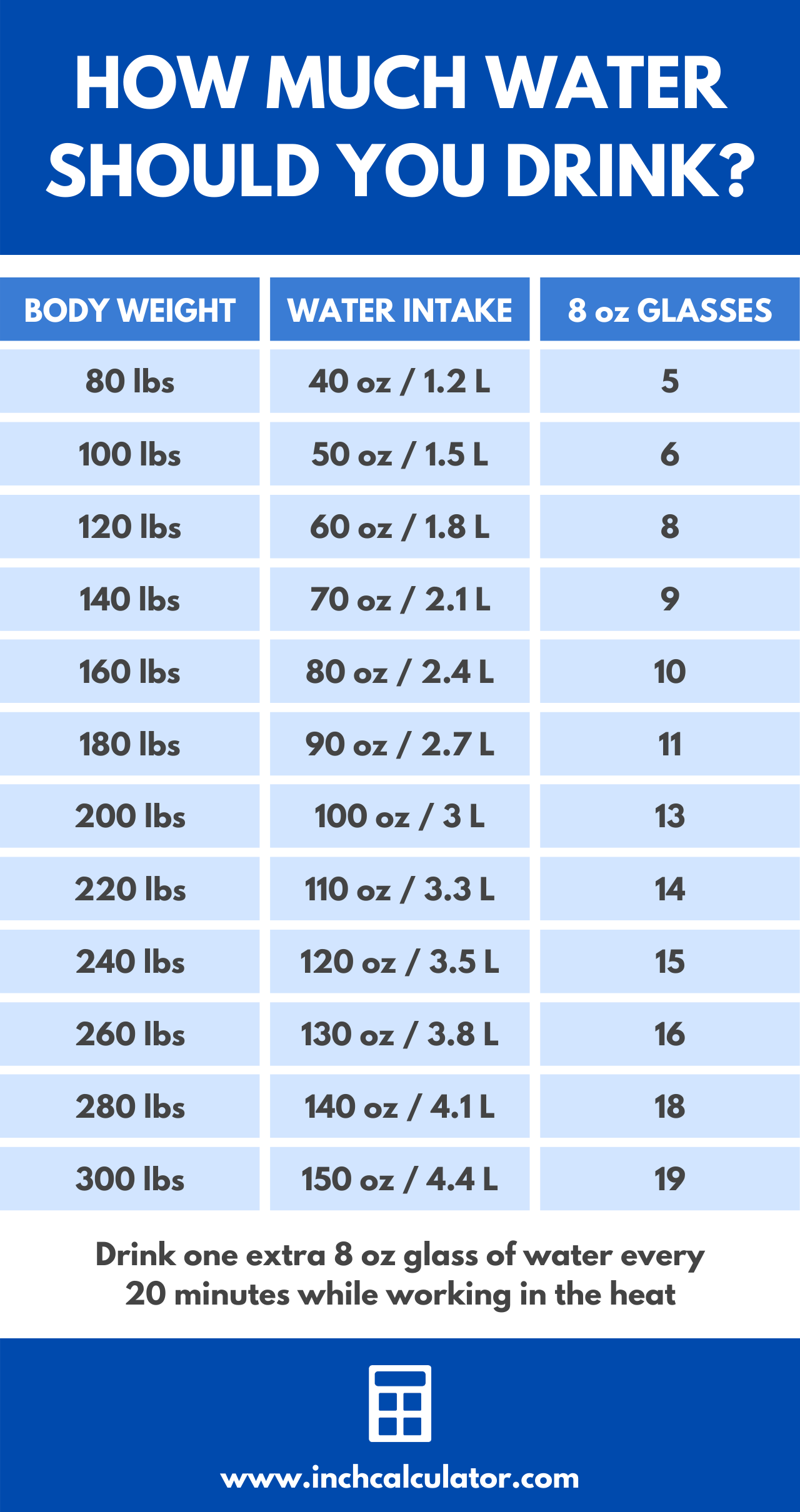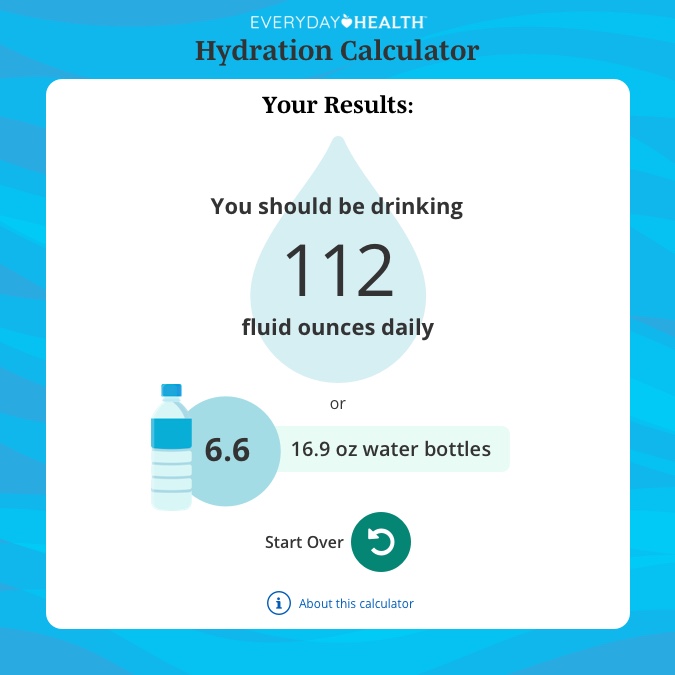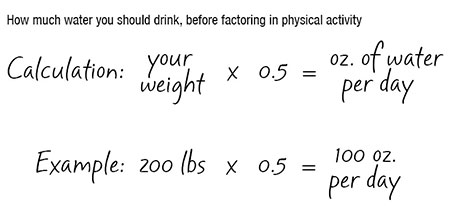How to Calculate How Much Water to Drink Daily for Hydration
To calculate how much water to drink, divide your body weight in pounds by 2 and drink that amount in ounces of water per day. For instance, if you weigh 150 pounds, you need to drink 75 ounces of water per day.
Drinking sufficient water is crucial for our overall health and well-being. It helps to regulate body temperature, keeps joints lubricated, protects sensitive tissues, and eliminates waste. However, it’s not always easy to know how much water to drink and when.
This is why it’s essential to understand the science behind hydration and learn how to calculate the right amount of water for your body. We’ll discuss the importance of hydration, how to calculate how much water to drink, and some tips to help you stay hydrated throughout the day.
Importance Of Hydration
Staying properly hydrated is crucial for maintaining overall health and well-being. Water is essential for the body to function optimally, playing a vital role in various physiological processes. Dehydration can have serious consequences, so understanding the importance of hydration is key to maintaining a healthy lifestyle.
The Role Of Water In The Body
The human body is composed of approximately 60% water, highlighting its significance in sustaining life. Water aids in digestion, nutrient absorption, temperature regulation, and the transportation of essential substances throughout the body. It also serves as a lubricant for joints and cushions vital organs.
Consequences Of Dehydration
Dehydration can lead to a range of adverse effects, including headaches, fatigue, dizziness, and impaired cognitive function. Prolonged dehydration may result in more serious complications such as kidney stones, urinary tract infections, and heat-related illnesses. It is essential to recognize the signs of dehydration and take proactive measures to prevent it.

Credit: www.inchcalculator.com
Factors Influencing Water Needs
To calculate your daily water intake, consider factors such as physical activity, climate, and overall health. These elements can influence how much water your body needs to function optimally. By taking these factors into account, you can determine the right amount of water to drink each day.
Factors Influencing Water Needs
Understanding the factors that influence your water needs is key to ensuring you stay properly hydrated throughout the day. Several factors, such as body weight and composition, environmental conditions, and physical activity levels, can affect how much water you should be drinking. Let’s take a closer look at each of these factors.
Body Weight And Composition
Your body weight and composition play a significant role in determining your water needs. Generally, the more you weigh, the more water you require. This is because water is essential for various bodily functions, including maintaining proper organ function, regulating body temperature, and aiding in digestion.
However, body composition also matters. Muscles contain more water than fat, so individuals with a higher muscle mass may need more water compared to those with a higher percentage of body fat. It’s important to consider both your weight and body composition when calculating your water intake.
Environmental Conditions
The environment you’re in can greatly impact your water needs. Hot and humid weather, for example, can increase your risk of dehydration as your body loses more water through sweat. In such conditions, it’s crucial to drink more water to compensate for the additional fluid loss.
Similarly, high-altitude locations can also affect your hydration levels. At higher altitudes, the air is typically drier, and your body may lose more water through increased respiration. Therefore, it’s essential to increase your water intake when in such environments to prevent dehydration.
Physical Activity Levels
Engaging in physical activity increases your water requirements as your body loses water through sweat to regulate your body temperature. The more intense and prolonged the activity, the more water you’ll need to replenish the fluids lost.
To determine your water needs during exercise, it’s recommended to drink about 17-20 ounces (500-600 ml) of water 2-3 hours before the activity. During the activity, aim to drink 7-10 ounces (200-300 ml) of water every 10-20 minutes. Afterward, continue hydrating to replace any fluid losses.
In conclusion, understanding the factors that influence your water needs is essential for maintaining proper hydration. By considering your body weight and composition, environmental conditions, and physical activity levels, you can calculate how much water to drink and ensure your body stays hydrated throughout the day. Remember, staying hydrated is crucial for overall health and well-being.
Current Water Intake Recommendations
Water is essential for the proper functioning of our body. To calculate how much water to drink, follow the current water intake recommendations which vary based on age, gender, activity level, and climate. It is generally recommended to drink at least 8 glasses (64 ounces) of water per day.
General Guidelines For Adults
For adults, it is recommended to drink around 8 cups of water per day.
Adjustments For Special Populations
Special populations like pregnant or breastfeeding women may need more water.
Calculating Your Baseline Water Requirement
Calculating your baseline water requirement is essential to determine how much water you should drink daily. By considering factors like your weight, activity level, and climate, you can accurately determine the amount of water your body needs to stay hydrated and healthy.
Keep reading to discover the simple steps to calculate your optimal water intake.
Understanding Daily Fluid Turnover
To calculate how much water you should be drinking each day, it’s important to understand your daily fluid turnover. This refers to the amount of water your body needs to maintain its functions and stay properly hydrated. Your daily fluid turnover can vary based on factors such as your age, sex, weight, activity level, and overall health. By calculating your baseline water requirement, you can ensure that you are giving your body the hydration it needs.
The ‘per Pound’ Rule
One simple method to calculate your baseline water requirement is to use the ‘per pound’ rule. According to this rule, you should drink half an ounce to one ounce of water per pound of body weight. For example, if you weigh 150 pounds, you should aim to drink 75 to 150 ounces of water each day. This range provides a general guideline for daily water intake based on your weight.
To calculate your baseline water requirement more accurately, you can follow these steps:
- Weigh yourself: Start by weighing yourself in pounds. Make sure to use an accurate scale.
- Convert pounds to ounces: Multiply your weight in pounds by 16 to convert it to ounces. For example, if you weigh 150 pounds, you would multiply 150 by 16 to get 2400 ounces.
- Adjust for activity level: Depending on how active you are, you may need to drink more water. If you have a sedentary lifestyle, multiply your weight in ounces by 0.5. If you are moderately active, multiply by 0.6, and if you are highly active, multiply by 0.7. This adjustment accounts for the additional water loss through sweat during physical activity.
Here’s a formula to summarize the calculation:
Baseline Water Requirement (in ounces) = Body Weight (in pounds) x 16 x Activity Level Adjustment
By following these steps, you can determine your baseline water requirement and ensure that you are meeting your body’s hydration needs. Keep in mind that this is a general guideline, and individual requirements may vary. It’s important to listen to your body and adjust your water intake accordingly. Staying properly hydrated is crucial for overall health and well-being.
Accounting For Exercise And Activity
To determine how much water to drink during exercise, calculate your sweat rate by weighing yourself before and after the workout. For every pound lost, drink 16-20 ounces of water to stay hydrated and maintain performance levels. Adjust based on individual needs and environmental conditions.
Accounting for Exercise and Activity
When it comes to staying hydrated, accounting for exercise and activity is crucial. If you’re working out or engaging in physical activity, you’ll need to drink more water to compensate for the fluids you’re losing through sweating.
Hydration for Casual vs. Intense Workouts
If you’re engaging in casual workouts or low-intensity activities, you should aim to drink at least 8 cups of water per day. However, if you’re engaging in intense workouts or high-intensity activities such as running, cycling, or weightlifting, you’ll need to drink more water. The American Council on Exercise recommends drinking 17-20 ounces of water 2-3 hours before exercising and drinking 7-10 ounces of water every 10-20 minutes during exercise.
Sports Drinks and Electrolytes
Sports drinks and electrolytes can also be helpful when engaging in intense workouts or high-intensity activities. Sports drinks contain electrolytes such as sodium and potassium, which can help replenish the fluids and electrolytes lost through sweating. However, it’s important to note that sports drinks can also contain added sugars and calories, so it’s important to read the label and choose a sports drink that’s low in sugar and calories.
In conclusion, accounting for exercise and activity is crucial when calculating how much water to drink. Whether you’re engaging in casual workouts or intense exercises, it’s important to stay hydrated to maintain your overall health and performance. By following these tips and guidelines, you can ensure that you’re drinking enough water to stay hydrated and healthy.

Credit: www.wikihow.com
Impact Of Diet On Hydration
The impact of diet on hydration is often overlooked, but it plays a crucial role in determining how much water our bodies need. The foods and beverages we consume can either contribute to our daily water intake or deplete our hydration levels. Understanding the impact of diet on hydration is essential for calculating how much water to drink for optimal health and well-being.
Water Content In Foods
Many foods have a high water content, which can contribute to overall hydration. Fruits and vegetables, such as watermelon, cucumber, and oranges, are particularly hydrating due to their high water content. Incorporating these water-rich foods into your diet can help increase your daily water intake.
Effects Of Caffeine And Alcohol
Caffeine and alcohol are diuretics, meaning they can lead to increased urine production and potential dehydration. While moderate consumption of caffeine and alcohol may not significantly impact hydration, excessive intake can have a diuretic effect, increasing the body’s water loss. It’s important to balance the consumption of caffeinated and alcoholic beverages with adequate water intake to maintain hydration levels.
Monitoring Hydration Status
Monitoring hydration status is crucial for determining how much water one should drink. By calculating factors like body weight, activity level, and climate, individuals can accurately determine their water intake needs, ensuring proper hydration throughout the day.
Urine Color Chart
Check your urine color against a chart to assess hydration levels.
Signs And Symptoms To Watch For
Be alert for key signs that indicate dehydration.
Monitoring hydration status is vital for overall health.
Urine Color Chart
Consult a urine color chart for hydration assessment.
Signs And Symptoms To Watch For
Be vigilant for signs signaling potential dehydration.
Tools And Apps For Tracking Water Intake
Track your daily water intake effortlessly with these essential tools and apps. Stay hydrated by calculating your personalized water consumption needs and receive timely reminders to ensure you meet your hydration goals.
Popular Hydration Apps
Using hydration apps can help you stay on top of your water intake goals.
Benefits Of Using Technology
Tracking water intake with apps makes it easier and more convenient.
Developing A Personal Hydration Plan
Developing a personal hydration plan involves calculating how much water to drink based on factors like body weight, activity level, and climate. To determine your water intake, a simple formula is to divide your body weight in pounds by two, which gives the number of ounces of water to consume daily.
Adjust this amount based on your activity level and climate to stay properly hydrated.
Setting Daily Goals
Developing a Personal Hydration Plan is crucial for overall well-being.
Tips For Increasing Water Consumption
To calculate water intake, consider body weight and activity level.
– Track progress with a water intake journal.
– Add flavor with fruits or herbs to water.
– Use a water bottle to carry water everywhere.
– Set reminders to drink water regularly.
– Drink water before meals to increase intake.
– Opt for water-rich foods like fruits and vegetables.
Make a hydration plan that suits your lifestyle and needs.
Common Myths About Hydration
Discover the truth behind common myths about hydration and learn how to calculate the right amount of water to drink. Stay hydrated with accurate information and ensure optimal health and well-being.
Eight Glasses A Day Rule
Hydration Myths Debunked
Hydration is essential for our overall health, but with the abundance of information available, it’s easy to fall for common myths about how much water we really need. Let’s delve into the truth behind these misconceptions.
Eight Glasses A Day Rule
One of the most prevalent hydration myths is the “eight glasses a day” rule. While it’s a good starting point, individual water needs vary based on factors like activity level and climate. Following a one-size-fits-all approach may not ensure optimal hydration.
Hydration Myths Debunked
- Myth: Clear urine means you’re well-hydrated.
- Fact: Urine color is not always an accurate indicator of hydration levels.
- Myth: Caffeinated beverages dehydrate you.
- Fact: While caffeine has a mild diuretic effect, moderate consumption doesn’t lead to significant dehydration.
- Myth: You only need to drink water when you’re thirsty.
- Fact: By the time you feel thirsty, you may already be slightly dehydrated.

Credit: www.everydayhealth.com
Frequently Asked Questions
How Much Water Should You Drink Based On Your Weight?
The amount of water you should drink depends on your weight. A general guideline is to drink half an ounce to one ounce of water per pound of body weight. For example, if you weigh 150 pounds, you should drink 75-150 ounces of water per day.
However, other factors such as activity level and climate may also affect your water intake needs.
How Do You Calculate How Much Water You Need?
To calculate how much water you need, multiply your body weight by 0. 67. This will give you the minimum number of ounces of water you should drink daily. However, factors such as physical activity, climate, and medical conditions may require more water intake.
It’s essential to listen to your body and adjust accordingly.
How Much Water Should I Drink According To A Day Chart?
According to a day chart, it is recommended to drink about 8 glasses or 64 ounces of water per day. Staying hydrated is important for overall health and well-being.
How Do You Count How Much Water You Need?
Calculate your water needs by dividing your weight in pounds by 2. That’s the number of ounces you should drink daily. Adjust for exercise and climate.
Conclusion
To ensure optimal health, it is crucial to calculate how much water to drink daily. By considering factors such as body weight, activity level, and climate, you can determine your individual hydration needs. Remember that staying properly hydrated is essential for bodily functions, energy levels, and overall well-being.
By following the guidelines provided in this blog post, you can easily determine the right amount of water to consume and maintain a healthy lifestyle. Cheers to your hydration journey!







